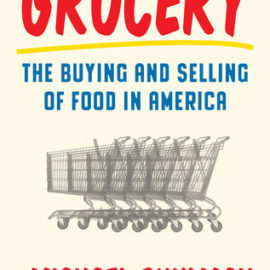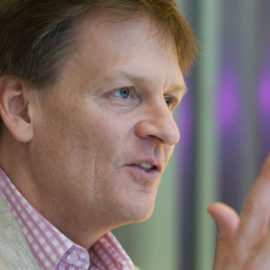Disclosure: I may earn affiliate revenue or commissions if you purchase products from links on my website. The prospect of compensation does not influence what I write about or how my posts are structured. The vast majority of articles on my website do not contain any affiliate links.
In 2018, my streak came to an end. I failed to finish 52 books as I had done during the last two years. The target is arbitrary, but even as my page count (a metric that Goodreads provides) and average complexity level (a metric I just made up) brought my effort on par with 2017, I’m left disappointed. Heading into the holiday season, I was surprised by the number of people who asked if I was on track. I could have easily sprinted across this finish line, but it would have been on a pathway inlaid with pulp fiction. The year ended with 43 books shelved and that’s good enough for me.
I’m disappointed because my reading was encumbered this year. In 2017, I mused that many of the stories I had read had been the highlights of my year. In contrast, my 2018 readings form an outline of my life, the excitement and volatility of which was seldom matched by any page-turner.
In January 2018, I decided it was time to find a new job. DevOps Engineers are in demand, but it’s hard to keep your balance on the top of the world when interviews can differ wildly in terms of expectations and content. I flopped an early phone screen and thought to myself, hey, why am I spending so much time with short guides on how to “hack,” “crack,” and do other violent things to technology interviews when I would probably enjoy reading textbooks? I primed with lighter Docker and DevOps books. Then, I read classic foundational works front-to-back, including Introduction to Algorithms and The Linux Handbook. I practiced theory and application each morning and fell asleep most nights with a book next to me. Before I knew it, I was traveling to interview at companies that I used to encounter only in my dreams.
I received offers from two phenomenal firms and ultimately decided to stay in Chicago. For the three-month non-compete period following my resignation, I only read a few books and instead focused on areas of my life that I felt I had neglected most over the preceding two years. After starting my new job, I had to take the Series 57 exam. The prep books were gleefully counted toward my yearly goal.
The only disappointment I really felt stemmed from a temporary relinquish of freedom and the difficulty I had getting back into a routine. All things considered, I’m in a better place today than twelve months ago–and reading helped me get here.
What you came for:
Most Overrated
Little Fires Everywhere by Celeste Ng (2017)
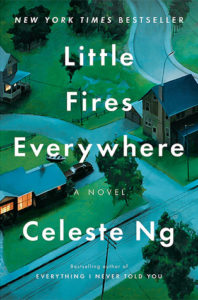 This book won Best Fiction in the 2017 Goodreads Choice Awards. Peeking at the results summary, it’s quite obvious that a certain voting bloc dominates every category within Goodreads’ year-end contest.
This book won Best Fiction in the 2017 Goodreads Choice Awards. Peeking at the results summary, it’s quite obvious that a certain voting bloc dominates every category within Goodreads’ year-end contest.
In my opinion, this book was selected as #1 because it extensively covers elements of sex, femininity, relationships, procreation, and motherhood in the planned community of Shaker Heights. It’s hard to critique without sounding trite and sexist. I didn’t like Little Fires Everywhere because the brilliant prose was overshadowed by the author’s overambitious interweaving. It goes from a bit contrived to positively maniacal.
The story is tied together neatly but the breadth to which the themes are explored is exhausting. The conclusion I’ve reached is that the author hoped to include emotional triggers applicable to every possible reader (and succeeded). In an interview, I was asked to describe the most recent book I read, which happened to be this one. The book resonates–and maybe the way I pitched it made me sound vaguely intellectual–but, as I said in my original review, you end up feeling kind of duped. The Shaker Heights Kid Cudi croons about is the one I will recall more fondly.
Judging Books by Covers
Knightmare on Wall Street by Edgar Perez (2013)
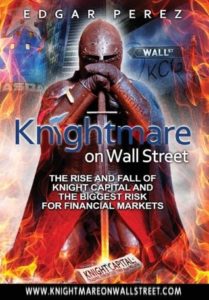
In 2018, feeling a bit burned out, I took a break from financial non-fiction. I picked up this one just before I left my job. It’s about the rise and fall of Knight Capital, which is especially relevant to me as a DevOps engineer in the proprietary trading industry. The “incident” which was central to the firm’s demise has inspired many a high-frequency trading firm’s risk control strategy. It is now discussed quasi–academically. I hoped that this book could help drive things home.
Knightmare on Wall Street turned out to be awful. The editing was half-rate, with sentence structure oddities, awkward usage, and even some obvious errors. The crucial section of the book–the day of the incident that led to the downfall of Knight Capital–is a Knightmare to get through. It fails to be exciting in the absence of being devoid of meaningful insight. On the technology side, it’s a rambling restatement of known facts with no depth. You get a few crumbs of information on the managerial ongoings, but nothing worthwhile.
What I found most humorous was that the author sprinkles participants’ Chase Corporate Challenge 5k times into their descriptions throughout the book. Such a thorough bit of research! All of the times mentioned are pedestrian (Edgar Perez and his editors didn’t seem to notice this) and have absolutely no correlation with the characters’ personas.
The audience for this book is non-existent. Or, so I thought. It struck me as nothing more than a box-checker for someone who wanted to be able to say he wrote a book while knowing that his prospective audience would never take the time to actually read it. Hilariously, the URL on the cover leads to a 404 error, but the author’s website reveals that he is, in fact, a “global technology and finance keynote speaker.” I hope that career path works out better for Mr. Perez.
Better picks for finance reading: Hedgehogging by Barton Biggs, The Futures: The Rise of the Speculator and the Origins of the World’s Biggest Markets by Emily Lambert
Technology Deep Dive with Some Knight Capital Context: DevOps for Finance by Jim Bird (It’s free; I haven’t finished it)
Book of the Year
Lake Success by Gary Shteyngart (2018)
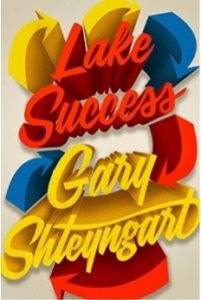
My roommate suggested this book. I found the suggestion suspect because my roommate is an asshole who “works in finance.” In Lake Success, I quickly saw what led to my roommate’s fondness. I also saw a lot of myself, both where I am today and where I hope to be tomorrow. My insecurities and my triumphs in an America stuck in purgatorial greatness.
The book can be thought of as an updated Bonfire of the Vanities crossed with American Psycho. But I don’t think that referencing any classics can sufficiently underscore the genius of Gary Shteyngart’s writing. It is the book of 2018, without a doubt, but is also one of the very best I have ever had the pleasure of reading. Critiquing it is beyond my capabilities.
My plea has been simple: read it immediately, and if you don’t like it, let’s never talk again. Yes, I have ended friendships over Lake Success. I am biased by the fact that I, too “work in finance” and have goals perhaps as outsized as the story’s main character, Barry Cohen. Similar drive; eerily-similar social inefficacies. Another reason I cannot view it objectively is that the “holy grail” in the story is an obscure timepiece that I have coveted for many years.
I guess the joke is on me because the book is satire. Maybe my friends and I are indeed 2019’s Sherman McCoy Juniors and the reason we all love Lake Success is because it validates our ambitions even as it reframes us as targets for contemporary pitchforking. Or, more bleakly, maybe it’s that we see the attainment of immortality as having our lives reprinted in books yet knowing that this work of fiction is probably the closest we’ll ever come.
Bill Gates was Right
Evicted by Matthew Desmond (2016)
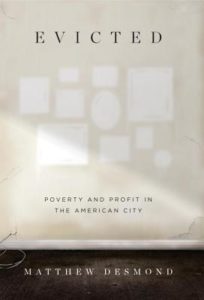
This was on Bill Gates’ 2017 year-end list. It is deserving of all acclaim. The author, Matthew Desmond, won a Pulitzer on his way to providing unbiased accounts of the post-2008 housing struggles faced by those living in poverty. In the naturally-segregated city of Milwaukee, Wisconsin, he spent equivalent time in both white and black neighborhoods.
Each year, I read at least one strong “social justice” book with the intent of ripping it up and providing contrary arguments. With this one, much like with The Diversity Myth last year and The New Jim Crow in 2016, I swallow my pride and admit that my views at the outset were misguided and ignorant (or, simply, misinformed).
You don’t put down this book ready to throw the blame on anyone. The one “it’s their problem” conclusion (that the author mentions) is that those on the brink of poverty should exercise more prudence in starting and expanding families. Aside from that, I found my thoughts revolved around high-level solutions and policy initiatives that could make meaningful change in communities that have lost hope. One tangent here is that those on the “real estate investing” bandwagon will probably learn more about the industry from this book than any of the “become-a-millionaire” bestsellers.
“Social justice” means a lot of different things. Books like this convince you to stop bickering over what those things are.
Most Overhyped
Fire & Fury by Michael Wolf (2018); The Fifth Risk by Michael Lewis (2018)
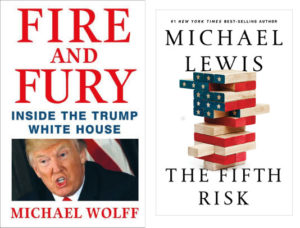 There is some appreciation reserved for those who purchase political books while shunning traditional MSM coverage. Problematically, the media coverage of such books reinforces the cycle of emotional outrage and neverending divisiveness. Case in point: Fire and Fury. Upon release, it was the #1 airport bookstore bestseller (according to facts intimated to me by airport book purveyors). I paid something like $35 for it because nearly every news outlet had me convinced that this was something big. That turned out to be a big lie supported by mountains of unverifiable gossip. The bombshells alluded to? About as substantive as weapons of mass destruction. The book has already been forgotten.
There is some appreciation reserved for those who purchase political books while shunning traditional MSM coverage. Problematically, the media coverage of such books reinforces the cycle of emotional outrage and neverending divisiveness. Case in point: Fire and Fury. Upon release, it was the #1 airport bookstore bestseller (according to facts intimated to me by airport book purveyors). I paid something like $35 for it because nearly every news outlet had me convinced that this was something big. That turned out to be a big lie supported by mountains of unverifiable gossip. The bombshells alluded to? About as substantive as weapons of mass destruction. The book has already been forgotten.
The silver lining of Fire and Fury is that it’s witty and well-written. From my original review:
Descriptions of some actors were pure genius, such as Ivanka having developed a “Disney Princess voice,” Mike Pence “do[ing] funerals and ribbon cuttings,” and that “[Hope Hicks] was in fact thought of as Trump’s real daughter, while Ivanka was thought of as his real wife.” The suggestion that Trump was only semi-literate was perhaps the most jaw-droppingly interesting tidbit in the book, and I found myself wrestling with that question to the bitter end.
However, as I theorized, a more fitting title would probably have been An entertaining, persuasive, but ultimately insecure, impatient and somewhat incompetent man and his crew take care of important business rather haphazardly.
Oh, and Michael Lewis wrote something. It’s barely 200 pages with margins so wide you can scribble complete sentences and line-spacing as thick as my pinky finger. On the topic of fingers, this book would be the size of the gap in The Creation of Adam if reasonably formatted. The Fifth Risk is an opportunistic (and, let’s say it together:) character-driven narrative; not necessarily a classic Lewis style but one that is more reminiscent of the fact that he once bound together disparate previously-published material into The Money Culture. The “fifth risk” in The Fifth Risk deals with the theme of project management. All of the smart people who read Michael Lewis can use it as an veil to talk about politics “at a higher level” at dinner parties and in Priority PassTM lounges.
Gateway Drugs
Kitchen Confidential by Anthony Bourdain (2000)
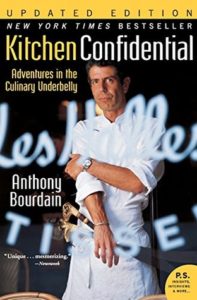
Anthony Bourdain died in 2018. I decided to buy the book that catapulted him to mainstream fame. Much was bestowed in his wake, the moniker The Most Interesting Man in the World warming my heart the most.
Kitchen Confidential is much darker than the chef’s beloved Netflix programs. It’s easy to be deluded by the lush visuals, upbeat music, and vibrancy of exotic locales that can be found on the screen. You may be surprised to learn that this book contains accounts of Anthony Bourdain’s struggle with drug addiction. The man has been called a badass and Hunter S. Thompson, but it’s not farfetched to also call him whitewashed. I know that word has a negative connotation in basically every use case that doesn’t deal with actually cleaning something, but it seems somehow disrespectful that, eighteen years later, there is widespread ignorance toward much of what was laid bare here.
I shunned culinary books in the past. It is one of the hardest genres to write. But Kitchen Confidential convinced me that I was missing out on something. I parlayed my enjoyment into several other excellent chef books. It increased my appreciation for everything that goes on in the restaurant industry. It bolstered my appreciation for life.


